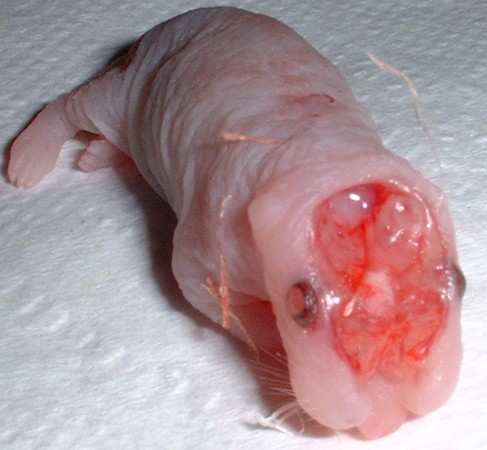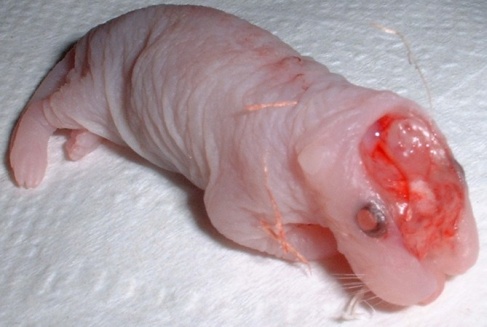Figure 1: Anencephaly in a newborn rat
Case history and photos
History
Litter was born 8/5/2003, the result of a mother/son breeding. Total pups in the litter were six: one with anencephaly, two fully-formed dead pups and three live, normal, healthy-looking pups. I was not there to witness the birth, and therefore, I don’t know if the pup with anencephaly was born alive.
I have to assume that the two fully-formed pups might have been lost due to the doe having trouble delivering the anencephaly pup (larger than normal amniotic sac?). When I did find Ginnie (Imagine My Surprise) with her new babies, they were all clean and in the nest-all six of them.
Mother’s Diet consisted of Envigo (Formerly Harlan) Teklad 2008 (for breeding females) with fresh fruits and vegetables. The bedding used for pregnant does and their pups is aspen shavings. They are housed in Sterilite bins with ventilation on one side and on the top and are given “out time” each day. Their water comes from the tap, aged for a day or so, and then poured into clean bottles with stainless steel tubes.
Clinical signs
- Skull covering the brain missing
- Part of the brain missing
Diagnosis
Anencephaly
Treatment
None
Outcome
The pup with anencephaly obviously did not survive. There have been no incidences of unusual health problems or other NTDs (neural tube disorder) with any related rats either prior to or since this pup was born.
Photos
The photos below show anencephaly in a newborn rat.
 Photo 1 |
 Photo 2 |
Case history and photos courtesy of Elisabeth Brooks
For more information about this case visit this Spoiled Ratten web page:
http://www.spoiledratten.com/rascalxginnie.html — Archived page from 2012-10-14 (via the Wayback Machine)


